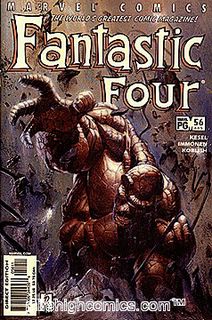
This is one of those cases where the interior art is superior to the cover, and where the cover has little if nothing to do with the narrative inside.
Without further ado...here is a modified version of what Scruton has to say about our affection for Superheroes (particularly Silver and Golden Age versions):
Comic books tried to create a new narrative audience, one that would not merely see the point of the heroic ideal, but also adopt it...
In contemporary comic books we see exactly what the transition from moderism to the 'post-modern' world involves, namely, the final rejection of high culture as a redemtive force and the ruination of the sacred in its last imagined form.
Modern comic book authors like Alan Moore and Warren Ellis were anticipated by Nietzsche, for whom the heroic in comic books is a sham...Rather than accept comic book superheroic characters in the terms suggested by the drama we should, Nietzsche advises, translate them 'into reality, into the modern -- let us be even crueller -- into the bourgeois!'...Nietzsche's judgements are seldom fair, and this is no exception. Comic books, particularly Gold and Silver Age, are concerned with creating a new kind of heroism, and to offer a new kind of solace to those of us for whom the old heroic way of life is not available. Heroes of the old type are larger-than-life versions of humanity, who live, love and suffer more completely than the rest of us, and who illustrate the possibilities to which man, with divine assistance, may aspire. Comic book superheroes belong to a new type. They exist in a state of exalted solitude (note Superman's "Fortress of Solitude"), the result of some primeval mistake; but they long either to redeem or to be redeemed, through an act of loving sacrifice...
Our sympathy for the comic book superhero...is not the artificial thing that Nietzsche pilloried. It stems from the deepdown recognition that his predicament is ours. Precisely because we live in a morbidly unheroic world -- the world of the cynic and the salesman, in which gods and heroes have no place -- we are driven to regard our own existence as some kind of mistake.
Ironically, much of the modern cynicism in comics is rooted in the book "Seduction of the Innocent" by Frederic Wertham. In the book, Wertham argues that the "crime books" glorify evil and are corrupting the minds of the young. His criticisms were largely baseless, founded on bad methodology and a Frankfurt school approach (with its inherent disdain of proletariat art), but they led to the strict regulation of comic books. This strict regulation, in turn, eventually caused an "anti-comics code" backlash. This backlash contained many books devoted to the very subjects restricted by the Comics Code. Many of the "great books" of the "graphic novel" era are a part of this backlash, but almost universally the books exhibit a cynicism and sophistication (in the classic sense) very much because they seek to "lower" the hero and bring him into the real world.
Gerard Jones, in his book Killing Monsters, argues that young people need comic books, or entertaiments like them, (and their portrayal of the ideal hero) in order to assist in the development of moral behaviors. I don't know if his thesis is correct, but it matches Scruton's description of "heroic art" and its intentions. Gerard Jones is a professional comic author so his advancing this kind of argument lends practical support to a philosophic position. In other words, he shows that the producers of the medium are thinking of the medium in the same way that a philosopher might.
But Gerard Jones has never written anything like The Watchment, The Authority, Hellblazer, or The Dark Knight Returns. His books all take place in the realm of imagination and do not attempt to bring the hero down into the real world.
This discussion begs the question..."What happens when we lower the echelon of the moral ideal?" In other words, "What does it say when Superman becomes less super? Or when The Question, a Randian objectivist moralist created by Steve Ditko, is turned into a madman?"
Those are some beginning thoughts which will be followed by a more specific discussion. My apologies once again to Roger Scruton.

No comments:
Post a Comment